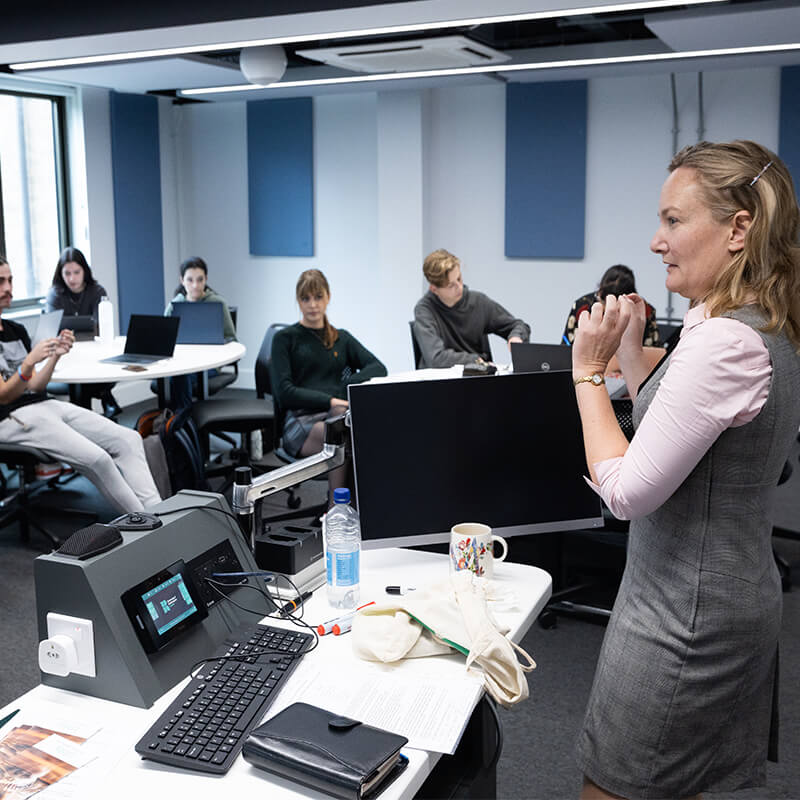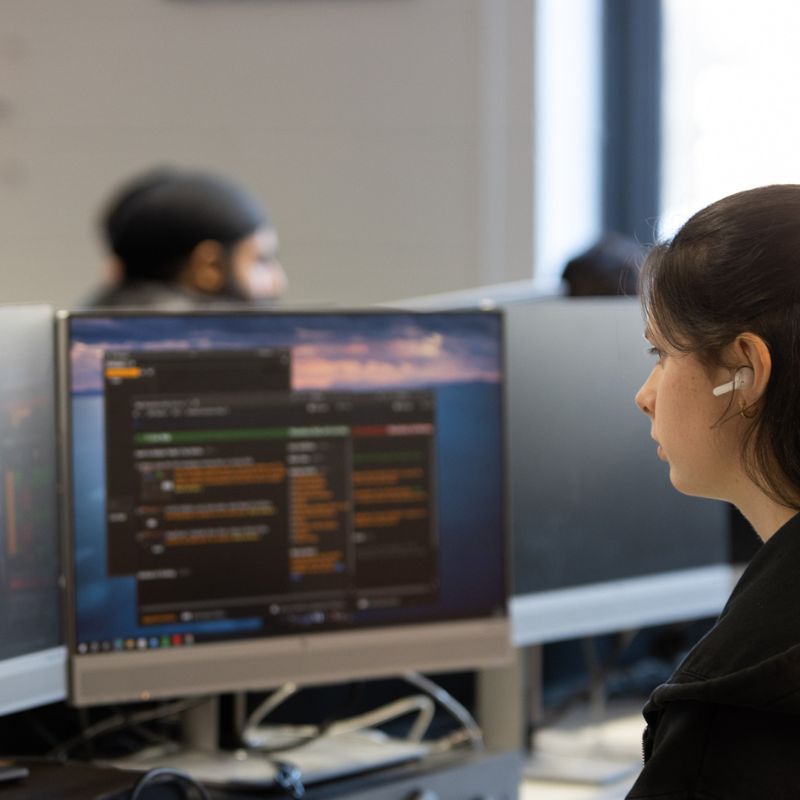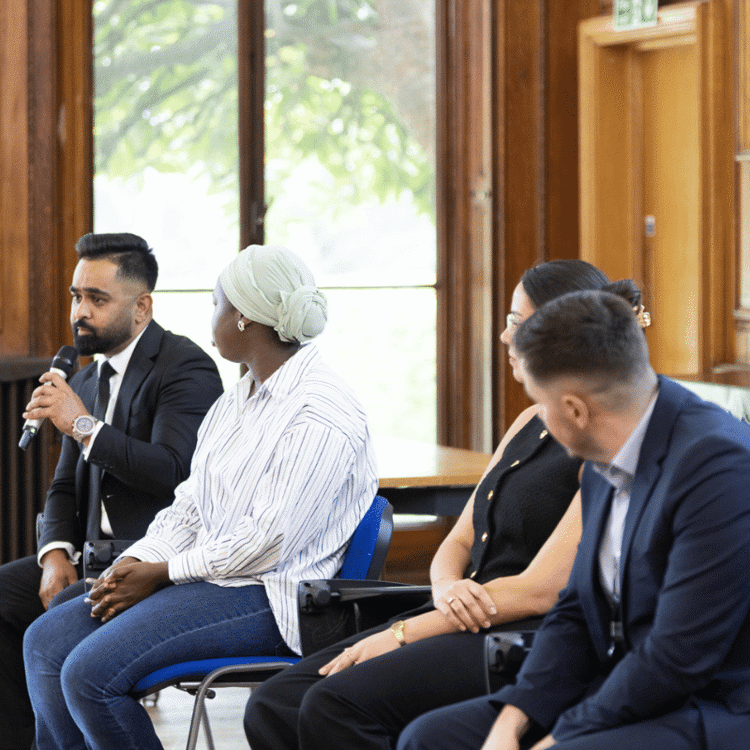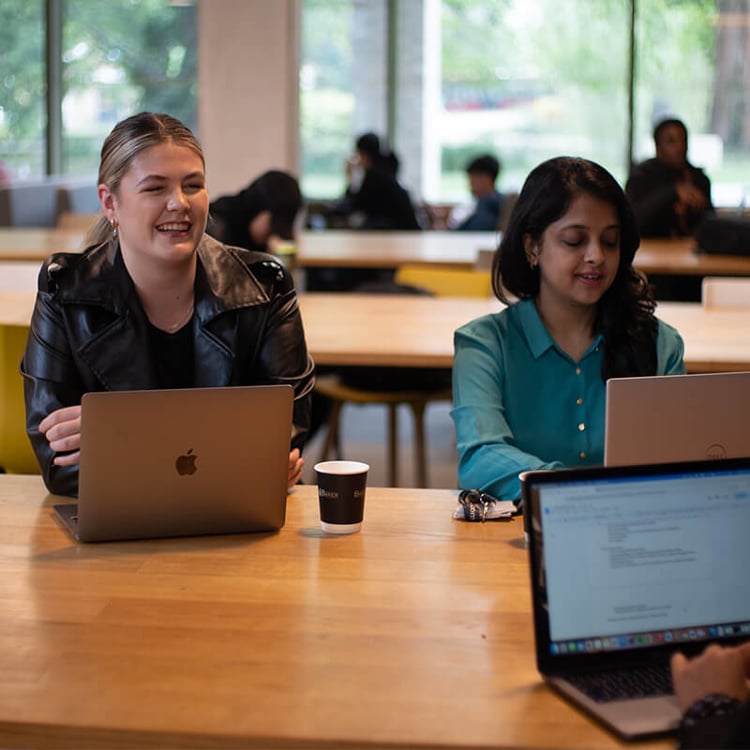Entry tariff:
112–128 UCAS points (or equivalent)
Foundation Year: 64–80 UCAS points (or equivalent)
International Foundation Pathway:
64 UCAS (or equivalent)
IELTS: 5.5
UCAS Code:
L100
NL12 (if choosing Foundation Year)
Start date(s):
January 2026
April 2026
September 2026
Gain the analytical skills that will help you lead, innovate, and thrive in global, digital and data-driven business environments.
As businesses and their managers face increasingly complex challenges around economic dynamics, shifts in societies and government decisions, our BSc Business Management and Economics will prepare you to satisfy this demand both in the private and public sector.
You will combine business practice with quantitative and analytical skills, which top employers are looking for in the new digital era.
Economics ranked 1st in London for Assessment and Feedback, Organisation and Management and Student Voice
National Student Survey 2024

You’ll gain knowledge of:
- Data analysis and presentation
- Rigorous thinking and strategic decision-making
- Using AI to analyse and solve complex business management problems
- Applying rational and heuristic choices to make economic, financial and managerial decisions
- Understanding business finances to manage budgets and measure performance
- Use quantitative methods to understand and design business strategies
- Developing ethical reasoning and sustainable business thinking
- Using sophisticated economic techniques to investigate relationships between economic, social and business data
You will be taught and supported by academics who have a wide range of experience in highly quantitative economics research, qualitative and quantitative business management research and working in business organisations. Their experience will allow you to connect your academic learning to the realities of business management and economics.
Why study business management and economics at Roehampton?
Gain a competitive edge by tackling current challenges, learning the tools and methods used by professionals, alongside career support.

Professionally focused curriculum
This course is aligned with emergent business and management career requirements, providing you with the skills to open wider career opportunities in economics, policy making, finance and more. You’ll also have the opportunity to put what you’ve learnt into a real workplace through our professional placement year and career pathway capstone project in your third year.

Robust employment support
We’ll be with you at every step to get you the career you want, with coaching, mentoring, CV and interview preparation support and you’ll also have access to employer-led sessions, where you can build your employability network.

Bloomberg Trading Room
You’ll have access to real-time industry standard software in our Bloomberg terminals. You’ll be able to analyse and interpret financial and economic information, just like investors and traders across the world!
These are the current planned modules on this course and may be subject to change.
These are the modules you will take if you join us from April 2026 onwards.
30 credits
This module will equip you with the financial knowledge and practical skills necessary for understanding and managing financial decisions, both personally and professionally.
You will be introduced to key financial principles including financial statements, investment appraisal, budgeting, risk analysis, and sustainability in finance. By incorporating tools such as Excel and real-life case studies, the module builds financial literacy and analytical thinking from the ground up.
A special focus is placed on fostering financial resilience, enabling you to understand the impact of financial decision-making in both small businesses and larger organisations.
Teaching and learning
You will be taught through lectures and workshops that involve a range of learning and teaching approaches, which includes online support and employability-related activities.
Lectures will cover core material, while workshops will consist of a blend of interactive activities, group work exercises and debates on set topics designed to support your skills development.
Assessment
This module will be assessed by case study coursework (30%) and reflective journals (70%).
30 credits
You will develop your talent, skills and competencies through focused business readiness activities and live global multicultural challenges. We apply industry specific knowledge; use practical case examples; live case studies and issues to draw out the skills and professional attitudes valued by employers; theoretical models and concepts to enable you to gain an understanding of industry requirements helping you transition into employment or entrepreneurship. We use a coaching approach to teaching to build confidence, critical thinking and embed learning into practice.
The module also allows for skill development, competencies in written academic, verbal and technological enquiry/research activities to help you progress through your chosen degree of study. It lays the foundation for further competency development needed to progress through each year which will be built on by other modules. You will engage in learning activities which develop your inclusive leadership skills and competencies in working in global and multi-cultural settings.
You will learn how to transform yourself professionally, enhance your career trajectories, and excel in your chosen fields while navigating the challenges of technological advancements, ethical and sustainability dilemmas, and the evolving demands of the modern workplace.
Topics covered include:
- Developing business sector awareness in team situations and meeting industry challenges
- Inclusive leadership and sustainability practices
- Your future careers, talent management, recruitment and selection, reflective practice, academic skills and technology working
Teaching and learning
You will be taught through lectures and workshops that involve a range of learning and teaching approaches, which includes online support and employability-related activities.
Lectures will be developed around the key concepts, models and frameworks around employability and the world of work, technology and competency development, talent acquisition, careers development and enterprise development.
Seminars will concentrate particularly on the elaboration of specific theoretical approaches with reference to their possible application through the selection of case examples, live business challenges, simulated recruitment and selection activities.
Assessment
This module will be assessed by a professional pitch and personal brand portfolio (50%) and a reflective report (50%).
30 credits
You will be introduced to key concepts and issues relating to business organisations in global environments.
You will focus on globalisation and the different types and objectives of business organisations. You will then cover a range of topics related to assessing the environments within which businesses operate such as economic growth, international trade and global industries. The link between business organisations and environments is further examined within the context of analytical frameworks such as PESTLE, Porter's 5 Forces and Demand/Supply analysis.
Teaching and learning
You will be taught through lectures and workshops that involve a range of learning and teaching approaches, which includes online support and employability-related activities.
Lectures will cover core business environment concepts and analytical frameworks, while workshops will engage you in solving practical global business challenges and strategic decision scenarios.
Workshops will consist of a blend of interactive global business simulations, group work on international market analysis and strategic decision-making exercises, and debates on contemporary global economic issues designed to support analytical and cross-cultural communication skills development.
Assessment
This module will be assessed by a reflective journal (30%) and coursework (70%).
30 credits
This module covers topics of mathematics and statistics, where you will become familiar with data analysis.
You will learn to apply quantitative methods to evaluate real-world issues related to equity and diversity. For instance, you will learn how statistical analysis can uncover disparities. Focusing on data interpretation and optimisation, you'll learn about the tools and techniques that can be used to evaluate efficient resource allocation and sustainable (optimal) investment strategies.
You will gain experience of working with applications such as Excel and Stata.
Teaching and learning
You will be taught through lectures and workshops that are underpinned by case-based learning. You will also have access to online support and employability-related activities.
Lectures will cover core material, while workshops will engage you in solving practical exercises aimed at supporting and consolidating your learning.
Assessment
This module will be assessed by a multiple-choice test (70%) and coursework (30%).
These are the current planned modules on this course and may be subject to change.
30 credits
This module helps you understand the challenges organisations face in a changing world influenced by climate change, social and political developments issues, technology, and workplace shifts at a local and global level.
Organisations and their leaders must be suitably adaptable and skilled at every level. The module provides frameworks for decision-making involving all stakeholders, focusing on sustainability, business ethics, social change (equity and social justice), climate change, and active citizenship.
Through case studies, you will tackle issues like governance (employees, managers, communities, consumers, shareholders, collective representation, e.g., trade unions, and so forth), ethical decision making, and the links to social justice. The primary focus and golden thread of this module is addressing the multiple challenging, complex issues that organisations, and the people therein, encounter, ensuring that their values remain consistent and intact in everyday practice.
This module equips you with the skills to navigate a rapidly changing business and social context, emphasising critical engagement with values in political change, influencing change management, and sustainability, key 21st-century employability skills.
Teaching and learning
Each week, you will engage in a meticulously organised learning experience comprised of lectures, an intensive workshop, and an additional 30 minutes of online support.
Lectures are designed to introduce and elaborate upon key concepts and frameworks relevant to the principal areas of the module. These sessions are based on indicative course content, aiming to equip you with a robust theoretical foundation.
Lecture topics will cover a broad spectrum of examples and case-based learning drawn from business ethical practices, values in leadership, sustainability, organisations, citizenship, and societal contexts to illustrate the practical applications of these concepts.
Workshop sessions are intended to delve deeper and put into practice the theoretical approaches discussed. These seminars focus on detailed examination of business case studies. You will analyse various scenarios likely to arise in organisational, management, and situations covering both business and public sector environments.
Assessment
This module will be assessed by a individual community-project report (50%) and a 10-minute group presentation (50%).
30 credits
You will gain insights from economic theory which is relevant to applications in managerial decision making. The module bridges the gap between economic theory and the day-to-day decision-making process of managers. The emphasis is on applying microeconomics concepts to solve problems, so to understand how business executives and other policy makers should take decisions.
The module material explains how EDI concepts, such as fair distribution of resources and income inequality impact business decisions. It also analyses diverse market segments and how consumer preferences can vary across different demographic groups, emphasising the importance of understanding these differences in management decisions.
You will be exposed to global examples to illustrate how economic policies, market structures, and managerial decisions differ across countries and cultures. The module also discusses how businesses must adapt their strategies in different cultural contexts.
You will look at practical projects, case studies, and simulations that mimic real-world business challenges. These will develop your critical thinking, problem-solving, and communication skills, which are essential for career success in managerial roles.
Teaching and learning
You will be taught through lectures and workshops that involve a range of learning and teaching approaches, which includes online support and employability-related activities.
Lectures will cover core material, and in workshops you will engage in solving practical exercises aimed at supporting and consolidating your learning.
You will use analytical software (i.e., Excel and Stata) and tools that are prevalent in business decision-making, to enhance your analytical skills. You will experiment win simulation games that will allow you to experiment with economic models and decision-making in a virtual environment.
Assessment
This module will be assessed by an online submission of data analysis supported by AI (30%) and an assignment based on a case study (70%).
30 credits
You will gain insights on the determination of macroeconomic variables and the effects of policy decisions. The module looks at these features of the economy distinguishing between short, medium, and long run. You will expand your understanding of general macroeconomic dynamics by also looking at the functioning of international trade and how globalisation affects the impact of macroeconomic policies.
The module looks at diverse perspectives in economic theories, focusing on case studies from various cultures, and contributions from economists of different backgrounds. It also highlights how macroeconomic policies affect various demographics differently.
You will look at concepts like sustainable growth, green economics, and the role of government and markets in promoting environmental sustainability. Alongside exploring the macroeconomic policies' impacts on ecological sustainability, such as carbon taxation, renewable energy investment, and regulatory frameworks.
You will look at practical projects, case studies, and simulations that mimic professional economic analysis and decision-making processes. These will develop skills that are valuable in the job market, such as data analysis, data manipulation, and policy evaluation.
Teaching and learning
You will be taught through lectures and workshops that involve a range of learning and teaching approaches, which includes online support and employability-related activities.
Lectures will cover core material, and in workshops you will engage in solving practical exercises aimed at supporting and consolidating your learning.
You will use technology for simulations, data analysis, and visualisation of economic data to gain a hands-on learning experience. You will enhance your data literacy skills by incorporating training on using economic databases, statistical software and programming tools relevant to macroeconomic analysis.
Assessment
This module will be assessed by an online submission case based on macroeconomics data analysis and reporting (30%) and an assignment based on four mini essay questions (70%).
30 credits
This module introduces you to the core principles and practices of project management, with a specific focus on their application within entrepreneurial and early-stage venture contexts. Unlike traditional corporate project settings, entrepreneurial environments often require leaner, more adaptive planning approaches due to uncertainty, resource constraints, and rapid iteration.
As such, you will develop the capacity to manage ambiguity, navigate change, and deliver value through disciplined but flexible project delivery methods.
You will be introduced to a range of project management methodologies including Waterfall, Agile, and Lean Startup, allowing you to critically assess which approach is most appropriate depending on project scope, timing, resources and stakeholder complexity. These frameworks are applied through practical exercises and software tools such as Gantt charts, Work Breakdown Structures (WBS), Kanban boards, and PIDs (Project Initiation Documents).
Through scenario-based learning and industry-informed simulations, you will explore the full project lifecycle - from initial scoping and planning, to execution, monitoring, and closure. Attention is given to risk identification and mitigation, stakeholder engagement, budgeting, and the use of key performance indicators (KPIs) to track progress.
The module places strong emphasis on communication and teamwork, where you will be expected to present your project proposals in professional formats, including project posters and written reports, as well as participate in pitch simulations aimed at securing mock investment or executive support.
Teaching and learning
You will be taught through lectures and workshops that involve a range of learning and teaching approaches, which includes online support and employability-related activities.
Lectures will cover core project management principles and enterprise methodologies, while workshops will consist of a blend of interactive project planning activities, group work on stakeholder management and risk assessment exercises, and peer feedback sessions on project pitches designed to support your leadership and project coordination skills development.
By integrating startup case studies, software tools and investor-style evaluation panels, the module provides you with a professionally focused, applied understanding of how to manage entrepreneurial projects effectively. You will learn how to respond to evolving business contexts, justify project decisions using data, and balance innovation with execution discipline.
Assessment
This module will be assessed by a presentation (30%) and coursework (70%).
These are the current planned modules on this course and may be subject to change.
This course offers all students the option of a one-year paid work placement, to boost your employability even further. If you choose this route, you will take the placement following year two of your course, and then return to complete your degree.
Why take a placement?
A placement year is the perfect opportunity to gain valuable work experience, to build on the career skills we will teach you on this degree. The connections you make on the placement will improve your career prospects further, and equip you with the skills you need to secure graduate-level employment.
How we support you
The University's Placement and Work Experience Team are experts at helping you to secure a placement. They will work closely with you from the start, helping you research potential employers, discover placement opportunities, create and pitch your CV, and will coach you to perform well in interviews. We aren't able to guarantee a placement, but our sector-leading advisors will give you the best possible chance of securing one.
Find out more about how we'll support you
We understand that your plans might change once you start your programme. If you decide not to do a placement, you will have the option of completing the three year version of your programme.
Whatever your choice, you will have access to many opportunities for work experience through our Placement and Work Experience Team, and access to face-to-face and 24/7 online careers support.
30 credits
In an ever-changing world, organisations must make strategic choices based on solid analyses and decision-making processes. This module adopts an innovative teaching approach to illustrate how strategic management theories and models can be applied in different contexts and how they inform decision-making.
You will develop a skill set founded on strategic management theory that will allow you to become an active participant in the strategy process that organisations deploy to ensure their long-term success.
This module will give you a clear understanding of what strategy is all about and how organisations develop it. You will learn how to apply the essential concepts and tools of strategy that will be useful in their business career whichever sector they choose.
Main topics revolve around the strategic position of organisations, the concept of competitive advantage (how to gain competitive advantage and/or sustain it for longer), and evaluation of business strategies. After a closer look at business and corporate levels of strategy, the module ends with selected aspects of implementation.
Teaching and learning
You will be taught through lectures and workshops that involve a range of learning and teaching approaches, which includes online support and employability-related activities.
Seminars will involve critical analysis of real-life cases to address a range of strategic problems. In this way, you will develop commercial awareness and recognise drivers for business success. You will also have the opportunity to work with others and communicate your views.
Assessment
This module will be assessed through a strategic analysis report (50%) and a recommendation report (50%). Using insights from Assessment 1, you will produce a strategic options report using the relevant frameworks.
30 credits
This module applies economic analysis to current trends and key challenges in the global economy.
The topics covered include economic growth and inequality across nations, climate change, demography, health, labour, artificial intelligence, institutions and development, and the macroeconomic conditions that have emerged in the aftermath of the great recession and the COVID-19 pandemic.
By studying this module, you will gain a fundamental understanding of the factual context surrounding today's challenges and how economics can be used to both illuminate major global problems and aid in designing effective policies. Additionally, you will benefit from opportunities for group work, which will enhance your collaborative and discussion skills.
You will examine economic inequalities, labour market disparities, and institutional responses to demographic shifts. Through case studies, you will assess how policies shape opportunities and explore solutions for fostering more inclusive economic systems.
You will explore the economic impact of climate change, biodiversity loss, and environmental policies, emphasising sustainable growth strategies. You will analyse policies such as carbon taxation and green innovation, gaining insights into balancing economic development with environmental responsibility.
Teaching and learning
You will be taught through lectures and workshops that involve a range of learning and teaching approaches, which includes online support and employability-related activities.
Lectures will cover core material, and in workshops you will engage in solving practical exercises aimed at supporting and consolidating your learning.
You will be equipped with practical skills for careers in economics, policy, and finance. Through data analysis, case studies, and group projects, you will apply economic theories to real-world challenges, enhancing your analytical and problem-solving abilities.
By integrating digital tools, economic simulations, and AI-driven analysis, the module will enhance your ability to engage with complex economic data. It also explores the impact of automation and AI on labor markets and education, preparing you for a tech-driven economy.
Assessment
This module will be assessed by a group presentation (30%) and an essay (70%).
30 credits
This intensive six-week taught module is designed to equip you with the essential competencies needed for professional consultancy practice.
This module serves as the skills-based foundation for the concurrent Roehampton Live Project, providing you with theoretical frameworks, practical tools, and professional capabilities required to deliver high-quality consultancy services to real clients.
Delivered as a professional bootcamp in a blocked format, this module creates an immersive learning environment where you will develop expertise in consultancy methodologies, client relationship management, strategic problem-solving, and professional communication. The intensive structure enables you to build confidence and competence before engaging with live client projects.
You will learn to integrate ethical considerations, social responsibility, and environmental sustainability into your consultancy approach, ensuring that your professional practice contributes to broader societal wellbeing.
Key areas of focus include consultancy frameworks and methodologies, client engagement and relationship management, evidence-based research and analysis techniques, strategic thinking and recommendation development, professional communication and presentation skills, and ethical consultancy practice and sustainability integration.
You will engage in real case studies and simulated client scenarios, working individually and in teams to apply learned concepts. The module incorporates guest speakers from industry, practical workshops, and reflective exercises to bridge theory and practice effectively.
This module prepares you for immediate application of skills in your concurrent Live Project module, where you will work with real clients as part of the ‘Roehampton Business Advice Centre’.
Teaching and learning
The module employs intensive blocked delivery with high contact hours to create an immersive professional development experience. Teaching methods include interactive workshops, case study analysis, simulation exercises, guest speaker sessions, and peer learning activities.
You will have 22 hours of lectures and 33 hours of workshops over six weeks. Lectures and workshops will be interactive in nature providing an environment for sharing business ideas, problem space mapping and evaluation opportunities and carrying business scoping exercise.
Assessment
This module will be assessed through consultancy toolkit portfolio coursework (50%) and a consultancy bid presentation (50%).
30 credits
This transformative capstone module is designed to bridge the gap between academic study and professional practice. You will have the opportunity to apply your academic knowledge in a real-world setting, developing strategic solutions to real-world business challenges.
You will work in consultancy teams as part of the Roehampton Business Advice Service, collaborating with a diverse range of external clients, including small and medium enterprises (SMEs), non-profit organisations, social enterprises, and larger companies. Global engagement projects will also be sought with partners outside of the UK, or projects that can have an influence on communities globally.
Each team will engage with a client to diagnose business problems, conduct in-depth research, and formulate evidence-based recommendations. By making an impact through real-world projects, you will enhance your ability to navigate complexity, synthesise information, and communicate your insights effectively to senior stakeholders.
While teamwork is a core aspect of this module, you will also undertake substantial individual work, ensuring that your personal contributions are critically assessed and aligned with your professional aspirations. The module is structured to simulate a professional consultancy environment, equipping you with the practical skills, commercial awareness, and adaptability needed for leadership roles in business and beyond.
You will be encouraged to develop ethical, socially responsible, and sustainable business solutions, ensuring that your recommendations contribute not only to organisational success but also to broader societal and environmental wellbeing.
Through a combination of practical experience, academic rigor, and reflective work-based learning, you will be empowered to become a strategic thinker, problem solver, and an influential professional. The module is designed to be a stepping stone into a range of career paths, with projects aligned with your own career goals. By the end of this module, you will have built a portfolio of high-quality work that demonstrates your analytical, decision-making, and communication skills.
Teaching and learning
Each consultancy team will be assigned an academic supervisor who will provide structured guidance, feedback, and oversight throughout the project.
You will have scheduled supervision meetings, including meetings with your supervisor at key milestones during the project to discuss progress, challenges, and next steps. Supervisors will support you in managing client relationships and ensure professionalism in communications.
Assessment
This module will be assessed by a consultancy report (50%) and a live presentation (50%).
These are the current planned modules on this course and may be subject to change.
This course offers a foundation year, which takes place at the beginning of your studies. Studying a foundation year will give you academic and practical experience, and a strong introduction to your subject, ensuring you succeed on your undergraduate degree.
30 credits
You will develop your core academic and integrated English language skills of speaking, listening, reading and writing. You will become familiar with key academic skills and concepts, such as referencing methods and awareness of academic integrity and tone. You will apply these skills and knowledge to both broad topics and also your chosen subject pathway.
Teaching and learning
You will be required to actively engage in on-campus learning for up to 10 hours a week.
You will be taught through a full range of teaching and learning methods, which include lectures, seminars, workshops, discussion groups, group directed tasks and presentations. This will enable you to learn from your peers and tutors in both structured and information settings.
You will be encouraged to think creatively about your approach to learning and discussions with your peers. You will also have access to recordings, resources, links and signposting through Moodle to enrich your learning.
Assessment
You will be assessed through group and individual presentations, comparative and reflective essays, multiple choice exams, coursework and reports, oral exams, portfolios, case studies and blogs.
30 credits
You will develop your core academic and integrated English language skills of speaking, listening, reading and writing. You will become familiar with key academic skills and concepts, such as referencing methods and awareness of academic integrity and tone. You will apply these skills and knowledge to both broad topics and also your chosen subject pathway.
Teaching and Learning
You will be required to actively engage in on-campus learning for up to 10 hours a week.
You will be taught through a full range of teaching and learning methods, which include lectures, seminars, workshops, discussion groups, group directed tasks and presentations. This will enable you to learn from your peers and tutors in both structured and information settings.
You will be encouraged to think creatively about your approach to learning and discussions with your peers. You will also have access to recordings, resources, links and signposting through Moodle to enrich your learning.
Assessment
You will be assessed through group and individual presentations, comparative and reflective essays, multiple choice exams, coursework and reports, oral exams, portfolios, case studies and blogs.
30 credits
You will develop your research, numeracy and information technology skills. You will investigate the difference between primary and secondary research, conduct your own research project and demonstrate your findings through data analysis. You will also develop your awareness of equality, diversion and inclusion in the UK, through a real-world issue; discrimination in the workplace.
Teaching and learning
You will be required to actively engage in on-campus learning for up to 10 hours a week.
You will be taught through a full range of teaching and learning methods, which include lectures, seminars, workshops, discussion groups, group directed tasks and presentations. This will enable you to learn from your peers and tutors in both structured and information settings.
You will be encouraged to think creatively about your approach to learning and discussions with your peers. You will also have access to recordings, resources, links and signposting through Moodle to enrich your learning.
Assessment
You will be assessed through group and individual presentations, comparative and reflective essays, multiple choice exams, coursework and reports, oral exams, portfolios, case studies and blogs.
30 credits
This module provides you with a foundational understanding of the principles and practices of business. You will explore the fundamental concepts of business environments, legal structures, and organisational dynamics, focusing on small and large businesses.
With the introduction of key principles of sustainability, social responsibility, and inclusive business practices in a globalised economy, it is expected that you will develop an understanding of contemporary issues affecting businesses at both local and global levels. The transferable skills you will develop in taking this module will enable you to critically evaluate new business ventures, create mission and vision statements, and engage in collaborative activities to develop essential teamwork and communication skills.
The module follows a thoughtful combination of theory, applied learning and reflective practices. By emphasising real-world applications, ethical considerations and global awareness, you will become a responsible, skilled and adaptive business professional.
Teaching and learning
Through interactive workshops, role-play activities, and case studies, it is expected that you will develop practical skills in business planning, stakeholder analysis, and strategic thinking.
The teaching delivery for each module consists of one, one-three-hour lecture and one, two-hour seminar per week. Seminars will consist of individual, group activities and role plays.
You will also have an additional 30 minutes of online support each week, which will consist of individual tasks such as quizzes, posting on discussion forums, watching videos and taking notes and reading.
Assessment
This module will be assessed using a business pitch and an individual written report.
40% - formative assessment where you will identify sources of business ideas (300 words) and summative assessment, where you will be required to present a business pitch to an audience of investors.
60% - individual written report, using a start-up company of your choice to identify and evaluate key challenges faced.
30 credits
This module delves deeper into core business functional areas and includes topics such as: marketing, finance, Human Resource Management (HRM) and leadership. The module is structured to enable you to gain an understanding of analytical frameworks such as SWOT, PESTLE and Porter’s Five Forces that will enable you to evaluate as well as identify opportunities and challenges within different business environments. The transferable skills you will develop in taking this module will enable you to critically evaluate the key functional aspects of business operations and application of theory to practice.
You will also evaluate the principles of product life cycle, and business portfolio management. This exploration will further develop your foundational skills that will enable you to deal with real-world business challenges and engage in critical discussions. Additionally, the module design follows a thoughtful combination of theory, applied learning and reflective practices, emphasising real-world applications, ethical considerations and global awareness, preparing you to become a responsible, skilled and adaptive business professional.
Teaching and learning
This module will be delivered to ensure active interactions through workshops and seminar activities while focusing on practical applications, such as cost behavior, breakeven analysis, market research, recruitment processes, and globalisation.
The teaching delivery for each module consists of one, one-three-hour lecture and one, two-hour seminar per week. Seminars will consist of individual, group activities and role plays.
You will also have an additional 30 minutes of asynchronous digital support each week, which will consist of individual tasks such as quizzes, posting on discussion forums, watching videos and taking notes and reading.
Assessment
This module will be assessed using a group presentation and an individual written report.
40% - group presentation, where you will use relevant tools to evaluate the macro environment of a business organisation of your choice.
60% - individual written report, acting like an independent management consultant, you will write an analytical business report on a company of your choice on how it can gain or increase its competitive advantage.
These are the current planned modules on this course and may be subject to change.

"If you know what you want to do and where you want to be, Roehampton will give you the tools and the right map to get you there.”
Van Loc, Business Management and Economics graduate
Careers
You’ll graduate with a set of highly marketable skills that will help you meet the many challenges in today’s rapidly changing world.
With our BSc Business Management and Economics degree, you’ll be able to follow a wide range of career paths, thanks to your strong analytical, quantitative and problem-solving skills.
Not only will you have developed both hard-economics and soft-business transferable skills, but you will have nurtured your professional skills, which are essential for navigating today’s business environments.
You’ll have a strong foundation for a career in management, finance, consulting, policy and entrepreneurship, taking on roles such as a:
- Business, Financial, Policy or Data Analyst
- Economic Researcher
- Banking Professional
- Business Development Manager
- Entrepreneur / Start up Founder

The Student Futures team is here to support you throughout your time at Roehampton and beyond.
They offer services tailored to your needs, helping you take confident steps towards your future.
You’ll have access to a wide range of career workshops and events, where you can engage with employers and develop the skills you need to succeed in the workplace.
These opportunities will help you build your CV, prepare for interviews, and connect with successful Roehampton graduates who are thriving in their careers. You’ll also be able to engage with our partners across London and beyond.
Wherever you want to go in the future, you'll be preparing for the world of work from your very first day.
Continue your studies at Roehampton
Once you've graduated, you could study one of our specialist postgraduate courses:
Learning & assessment
The course combines business knowledge acquisition with quantitative economics training.
Teaching is implemented by a coaching approach, which will cultivate your critical thinking, and collaboration and professional skills.
You will have plenty of opportunities to test your knowledge by analysing and solving realistic, real-world scenarios that reflect contemporary challenges faced by managers, business and policy makers. These cases are often based on real events, encouraging you to apply theoretical concepts to practical situations.
You will engage with live projects, simulated policy implementations, and applied research activities.
In your final year, you can undertake a capstone project, where you can choose from a range of pathways from research to sustainability-focused interventions. If you’re interested in more extensive industry immersion, our optional Professional Experience Year will give you valuable opportunities to apply your learning to real-world settings, as well as developing your employability skills, and building your industry connections.
We will empower you to take ownership of your learning journey and develop the mindset to be a lifelong learner. We will facilitate your learning through reflective questioning, structured, personalised feedback, and mentoring that will enhance your personal growth and academic independence.
You’ll gain key skills in resilience, adaptability and professional self-awareness and put yourself in a confidence place for future study or employment.
In every module, you will learn technical quantitative skills that are then applied in real-world business cases, live projects, and reflective practices.
Teaching integrates lectures, solving abstract problem sets and engaging in practical workshops and case studies. These activities take place in state-of-the-art facilities, including our Bloomberg Trading Room, and make use of relevant software packages, like Stata and SPSS.
This blend promotes critical, active and applied learning that will prepare you for new digital and global business environments.
How you'll be assessed
Assessments are authentic, industry-relevant, enabling you to apply your knowledge to a wide variety of assessments alongside formal tests and exams.
These include:
- Data analysis
- Critical use of Artificial Intelligence
- Theoretical problem sets
- Posters and presentations
- Business projects creation and management
- Business consultancy projects
- Reflective reports on business management decisions
Opportunities & facilities
At Roehampton, you will become part of a values-led, globally conscious academic community where innovation, sustainability, and inclusive leadership are central to how we teach, learn and build the future.

Bloomberg Trading Room
You'll have access to the same powerful tools that professionals use to analyse real-time finance and economics data, stay ahead of the curve with the latest insights, and build the skills that will set you apart in the competitive finance industry.

Roehampton Business Laboratory
Our enterprise incubator will support you in developing and scaling entrepreneurial ideas. It also houses signature initiatives like the RISE Prize and the Dragon's Den Style Launchpad showcase.
Celebrating innovation at the LaunchPad start-up awards 2025

World-class library
Home to hundreds of thousands of books, over 1,000 seats, and modern, collaborative and silent study spaces. You'll also have access to a vast range of online resources, like e-books, journals, and databases whenever you want.
Open days
Get a real taste of our campus, community and what it’s like to study at Roehampton
Applying
Full-time UK undergraduate students apply through UCAS.
Entry tariff
112–128 UCAS points (or equivalent)
Foundation Year: 64–80 UCAS points (or equivalent)
Looking to work out your UCAS points or find out about our entry requirements? Find out more.
When we consider applications to study with us, we form a complete view of your achievements to date, and future potential, and can offer flexibility in entry requirements. Find out more about our Contextual Offer scheme.
General entry requirements
International undergraduate students apply through our direct application system.
Entry tariff
112–128 UCAS points (or equivalent)
International Foundation Pathway:
64 UCAS (or equivalent)
IELTS: 5.5
Looking to work out your UCAS points or find out about our entry requirements? Find out more.
When we consider applications to study with us, we form a complete view of your achievements to date, and future potential, and can offer flexibility in entry requirements. Find out more about our Contextual Offer scheme.
General entry requirements
Fees and funding
UK students
Tuition fees
| Entry date | Undergraduate Year 1 | Undergraduate Foundation Year |
|---|---|---|
| April 2026 | £9,535 | – |
| September 2026 | £9,790 | £5,914 |
| January 2027 | £9,790 | – |
| April 2027 | £9,790 | – |
Prices shown are for the first year of your degree.
Funding your studies
We also provide other ways to support the cost of living, including on-campus car parking, hardship support and some of the most affordable student accommodation and catering in London.
International students
Tuition fees
| Entry date | Undergraduate Year 1 | Undergraduate Foundation Year | International Foundation Pathway | International Year 1 in Business |
|---|---|---|---|---|
| April 2026 | £16,950 | – | – | – |
| September 2026 | £17,628 | £17,628 | £17,628 | £17,628 |
| January 2027 | £17,628 | – | £17,628 | £17,628 |
| April 2027 | £17,628 | – | – | – |
Prices shown are for the first year of your degree.
Funding your studies
We also provide other ways to support the cost of living, including on-campus car parking, hardship support and some of the most affordable student accommodation and catering in London.






